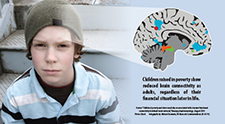Office of Research & Development |
 |
Office of Research & Development |
 |

VA Research Currents archive
August 20, 2014

Children raised in poverty show reduced brain connectivity as adults, regardless of their fi nancial situation later in life.
Childhood poverty could lead to poorer physical and mental health in adulthood. A study published in August 2014 in the journal Neuropsychopharmacology found that childhood poverty and the chronic stress associated with it tended to result in changes to brain networks involved in regulating emotions.
Nearly 1 in 4 children in the United States is currently living below the poverty line. Research shows that children in these situations are subjected to increased rates of psychological and physical stressors. This includes family disruption, unresponsive parenting, violence, and exposure to harsh environments.
"We found childhood poverty was associated with altered brain connectivity and a higher cortisol response to stress," says Dr. Rebecca Sripada, an advanced fellow at VA's Serious Mental illness Treatment Resource and Evaluation Center in Ann Arbor, Mich. Cortisol, often called the stress hormone, is an important part of the body's "fight or flight" response. Elevated levels for prolonged periods of time can lead to impaired cognitive function, as well as a variety of physical ailments.
The study, which also included researchers from Cornell University, followed 52 9-year-olds from upstate New York. Twenty-six of the children were from low-income backgrounds, while the other 26 came from families with incomes of two to four times the poverty line. At the time of the study, they were in their early twenties.
Participants provided saliva samples before and immediately after a social stress test that included participating in a mock job interview and solving a challenging mental math problem in front of an audience. They also underwent MRI brain scans.
Participants with lower childhood income revealed less connectivity in the brain's default mode network, a large, distributed brain network associated with internally focused thought, spontaneous cognition, and memory.
"Problems with the default mode network are sometimes associated with less efficient cognitive processing or greater risk of stress-related disorders," says Sripada. "This could represent a biological marker for exaggerated stress risk."
Perhaps most interestingly, the study's authors say they controlled for current wealth, meaning that regardless of how much income the participants had as adults, they still showed the effects of their childhood poverty.
The authors suggest further studies to determine exactly what neural effects poverty and chronic stress in childhood can have and whether or not they are reversible. "If we can get a better understanding of the way poverty affects the brain, then maybe we can design some interventions to help these individuals," says Sripada. "This is something that applies to everyone, be they Veterans or civilians."